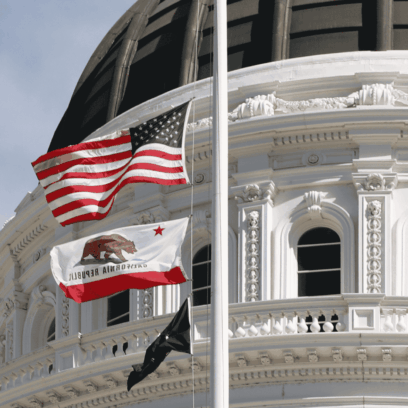SB 253 and SB 261: Navigating California’s Climate Legislation


🌍 Carbon markets can feel overwhelming—fragmented data, limited transparency, and conflicting advice make it hard to know where to start. In this webinar, our experts give a clear, practical introduction to the VCM.

FW Sustainability Report
Learn more about how Fierce Whiskers has made sustainable choices every step of the way by downloading its full sustainability report.
A detailed guide to California’s new climate laws SB 253 and SB 261 for US companies doing business in the state.
On October 7, 2023, California (CA) Governor Gavin Newsom signed into law Senate Bill (SB) 253 and SB 261, groundbreaking regulations that mandate businesses operating in CA with substantial annual revenues—over $1 billion for SB 253 and above $500 million for SB 261—to disclose comprehensive greenhouse gas (GHG) emissions and climate-related financial risks. These laws require companies to account for all direct and indirect emissions through detailed reporting of Scopes 1, 2, and 3 emissions (SB 253) and to conduct a thorough analysis and disclosure of financial risks associated with climate change (SB 261). With the legislation in effect, the compliance clock is ticking, meaning businesses operating in CA should start preparing now to prevent non-compliance penalties and to signal sustainability leadership to stakeholders, ensuring an ROI on sustainability initiatives.
Who Is Affected and How?
Approximately 5,400 companies will be impacted by SB 253, as per this source. Here’s a table showing the breakdown of these two laws, including the companies affected:
| Doing Business in CA1 | SB 253 Requirements | SB 253, 1st Reporting Year (Annual) | SB 261 Requirements | SB 261, 1st Reporting Year (Biennial) |
| $1 billion+ annual revenue | GHG Emissions Disclosure | 2026 (Scope 1 & 2), 2027 (Scope 3) | Financial Risk Report | 2024 |
| $500 million+ annual revenue | N/A | N/A | Financial Risk Report | 2024 |
| Up to $500 million annual revenue | N/A | N/A | N/A | N/A |
1A company is deemed to be “doing business” in California if it engages in any transaction for the purpose of financial gain within California, is organized or commercially domiciled in California, or its California sales, property, or payroll exceed the amounts listed here.
Note: The laws do not explicitly differentiate between in-state and out-of-state operations for businesses that meet the criteria above. Hence, it can be inferred that once a business is deemed to be affected, the requirements apply to all operations of the business.
Summary of CA SB 253: Climate Corporate Data Accountability Act
SB 253, also known as the Climate Corporate Data Accountability Act, aims to ensure that companies disclose their GHG emissions and climate-related financial risks as part of CA’s broader effort to address climate change and promote transparency surrounding sustainability in business operations. Here are some highlights from CA’s SB 253:
- Purpose: Entities with annual revenues exceeding $1 billion and conducting business in California must disclose their GHG emissions.
- Scope: The disclosure encompasses Scope 1 (direct), Scope 2 (indirect from energy consumption), and Scope 3 (indirect from supply chain) emissions.
- Timeline: The CA Air Resources Board (CARB) is tasked with establishing regulations by January 1, 2025. Reporting for Scope 1 and 2 emissions starts in 2026, and Scope 3 emissions in 2027.
- Disclosure Requirements: All emissions data must be publicly disclosed and verified independently to ensure accuracy and accountability.
- Regulatory Oversight and Penalties: The act empowers CARB to impose administrative penalties (up to $500,000) for non-compliance, including non-filing, late filing, or failure to meet requirements. The board will also oversee the assurance process, ensuring sufficient capacity and timely reporting.
- Public Accessibility and Reporting: A digital platform will facilitate public access to disclosed data, providing both detailed and aggregated views.
- Ongoing Assessment and Updates: CARB will periodically assess global GHG accounting/reporting standards and may adopt alternative standards if deemed more effective. It will also review and update the qualifications for third-party assurance providers based on evolving trends.
- Fees and Funds: Reporting entities must pay an annual fee to cover administrative costs, contributing to the Climate Accountability and Emissions Disclosure Fund. However, the specific fee amount is not mentioned in the legislation.
- Legislative Review: A public report will assess disclosed emissions in relation to state climate goals.
Summary of CA SB 261: Climate-Related Financial Risk Disclosure Act
SB 261, titled “Greenhouse gases: climate-related financial risk,” will require businesses to disclose their financial risks associated with climate change and the strategies adopted to mitigate these risks, aligning with global efforts. Here are some highlights from CA’s SB 261:
- Purpose: Entities with annual revenues exceeding $500 million and conducting business in California must prepare and disclose a climate-related financial risk report.
- Scope: The report must detail the entity’s financial risks associated with climate change and strategies for mitigation and adaptation.
- Timeline: Reporting for climate-related financial risks starts in 2024.
- Disclosure Requirements: The climate-related financial risk report should adhere to the guidelines set by the Task Force on Climate-Related Financial Disclosures (TCFD) or any subsequent related publication.
- Public Accessibility and Reporting: Entities must make the reports publicly available on their websites and affirm compliance to the CA Secretary of State.
- Regulatory Oversight and Penalties: CARB is authorized to contract with a non-profit climate reporting organization to prepare an biennial public report on these disclosures. The board can also impose administrative penalties for non-compliance, such as failure to publish the report or providing insufficient information.
- Public Accessibility and Reporting: The non-profit climate reporting organization designated by CARB is tasked with preparing a detailed public report that includes a review of disclosures, analysis of systemic risks, and identification of inadequate reports. It will also convene representatives from various sectors, state agencies, investment managers, and other stakeholders to discuss best practices for climate-related financial risk disclosure.
- Alignment with Federal Regulations: If similar federal laws or regulations are enacted, a report prepared under those requirements can satisfy the state’s requirements, provided it contains materially similar information.
CA’s SB 253 and SB 261 Compared to Other Climate Legislation
When placed in a global context, CA’s climate disclosure laws are some of the most ambitious. They precede and go beyond the Securities and Exchange Commission (SEC)’s proposed climate disclosure rule in the United States (US), which have not yet been passed, aligning more closely with the European Union’s (EU) Corporate Sustainability Reporting Directive (CSRD) in their rigor and depth.
What distinguishes CA’s approach is the insistence on Scope 3 emissions disclosure, a requirement that many jurisdictions have yet to enforce. This emphasis places a spotlight on companies’ extended supply chains, making these laws a benchmark for comprehensive climate reporting.
Corporate Support for Climate Disclosures in CA
Several prominent companies have come forward in support of these climate disclosure bills in CA. Their advocacy has been instrumental in championing the importance of transparency and accountability in the corporate world. Some of these companies include Apple, Google, and Microsoft, among others, as highlighted in this article.
Navigating Compliance: Practical Steps Forward
The journey from legislative text to compliance can seem overwhelming. Again, it’s important to note that any organization doing business in CA that meets the criteria above for compliance must then report on all operations, both inside and outside of CA. CARB can bring civil actions against companies and seek civil penalties for violations of the act, with a maximum fine of $500,000, so it’s important to stay informed and prepared if your business may be affected by these laws. Here’s how companies can navigate this path:
How to Comply with SB 253 and SB 261
| Step | Description | Relevance to SB 253 | Relevance to SB 261 |
| 1. Internal Review | Conduct a comprehensive review of current GHG emissions, climate-related financial risks, and existing disclosure practices. Assess your company’s carbon footprint, vulnerabilities, and alignment with global standards and frameworks. | Essential for understanding the Scope 1, 2, and 3 emissions that need to be disclosed. | Crucial for identifying and evaluating climate-related financial risks that need to be reported. |
| 2. Data Management Strategy | Develop a robust data management strategy to reliably track, report, and verify emissions data across all scopes. Establish clear communication channels with suppliers for data sharing, especially for Scope 3 emissions. | Critical for ensuring accurate and verifiable emissions disclosures. | Important for preparing comprehensive climate-related financial risk reports. |
| 3. Engage Expertise | Engage with experts and sustainability consultants, such as CarbonBetter, to navigate the complexities of the new requirements. Leverage expert guidance for data management, strategic planning, and compliance. | Helpful for understanding the nuances of emissions reporting and verification requirements. | Beneficial for interpreting and aligning with the TCFD framework for financial risk reporting. |
| 4. Prepare for Verification | Ensure that your data is ready for third-party verification. Implement quality checks and data validation processes to ensure accuracy and reliability in reporting. | Necessary for compliance with SB 253’s requirement for independent verification of emissions data. | While SB 261 does not explicitly mention verification, ensuring data accuracy is a best practice. |
| 5. Public Reporting Strategy | Develop a strategy for transparent and public disclosure of emissions and climate-related financial risks. Plan how to communicate sustainability initiatives effectively to stakeholders, investors, and the public. | Aligns with SB 253’s requirement to make emissions data publicly available on a digital registry administered by CARB. | Aligns with SB 261’s requirement to make climate-related financial risk reports available on the company’s website. |
| 6. Legal & Regulatory Alignment | Stay updated with legal requirements and ensure that your compliance strategy aligns with the legislative mandates of SB 253 and SB 261. Regularly review updates and amendments to the laws. | Ensures adherence to SB 253 and avoids potential penalties. | Ensures adherence to SB 261 and prepares the company for biennial reporting. |
| 7. Continuous Improvement | Regularly review and update your compliance strategy to adapt to evolving regulations and industry best practices. Focus on continuous improvement in data accuracy, reporting transparency, and emissions reduction. | Supports ongoing compliance with SB 253 and positions the company as a leader in sustainability. | Supports ongoing compliance with SB 261 and enhances the company’s reputation for managing climate-related financial risks. |
Conclusion
The signing into law of SB 253 and SB 261 marks a significant increase in corporate environmental responsibility in CA. These laws mandate businesses operating in CA to be more transparent in disclosing their GHG emissions and climate-related financial risks. At CarbonBetter, we recognize the complexities and nuances involved in navigating these new requirements. No matter where you are in your sustainability journey, we can help. Contact us today to learn more.
SB 253 and SB 261 align closely with global climate disclosure frameworks such as the Task Force on Climate-Related Financial Disclosures (TCFD) and the European Union’s Corporate Sustainability Reporting Directive (CSRD). These California laws emphasize comprehensive reporting, including Scope 3 emissions, similar to international standards.
Any organization that does business in CA and meets the revenue thresholds is subject to the requirements of SB 253 and SB 261 and must report on all emissions and climate-related financial risks as outlined in the laws, whether they occured in CA or out-of-state.
Businesses can start by conducting an internal review of their current emissions and financial risks associated with climate change. Developing robust data management systems, preparing for third-party verification, and creating a transparent public reporting strategy are also crucial steps. Consulting with experts like CarbonBetter can streamline the compliance process.
While SB 253 and SB 261 apply to businesses across various sectors, industries with substantial direct and indirect emissions, such as manufacturing, energy, and transportation, may face more complexities in reporting and compliance due to their extensive supply chains and operational scopes.
CarbonBetter offers tailored guidance and support to businesses navigating the compliance requirements of SB 253 and SB 261. From data management and strategic planning to ensuring accurate and timely reporting, CarbonBetter provides the insights, tools, and expertise needed for seamless compliance. Contact us today to learn more.



